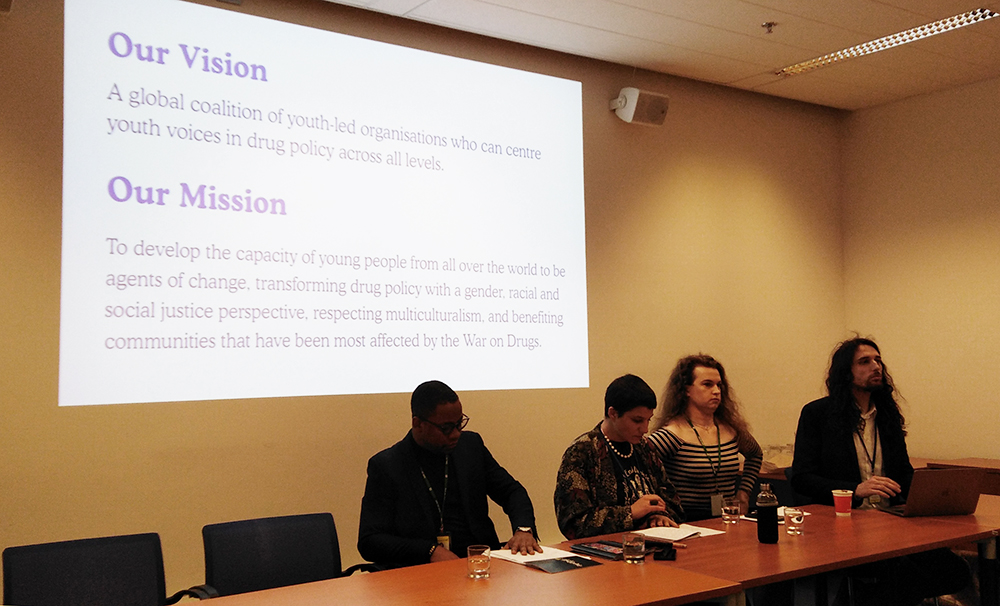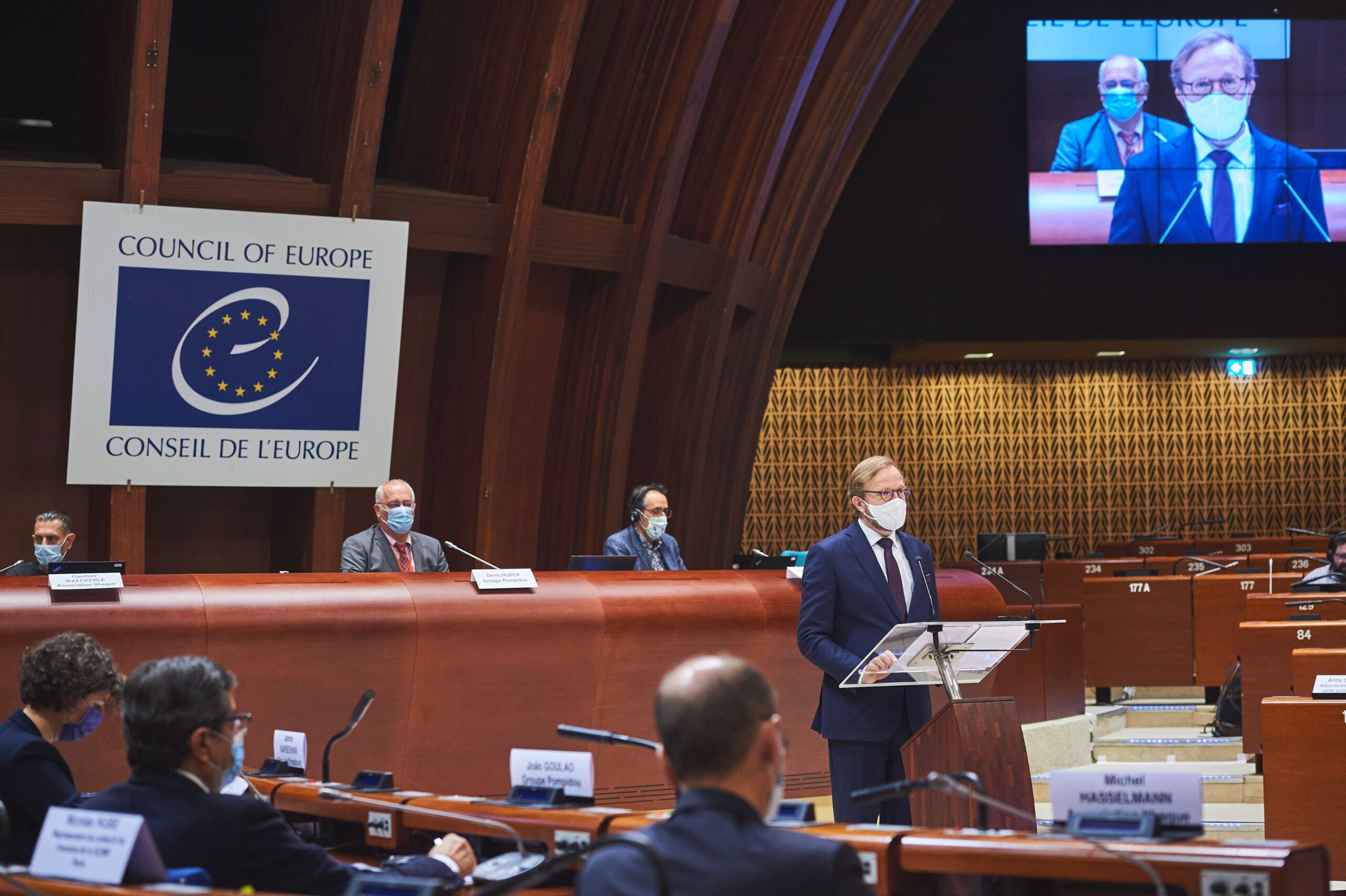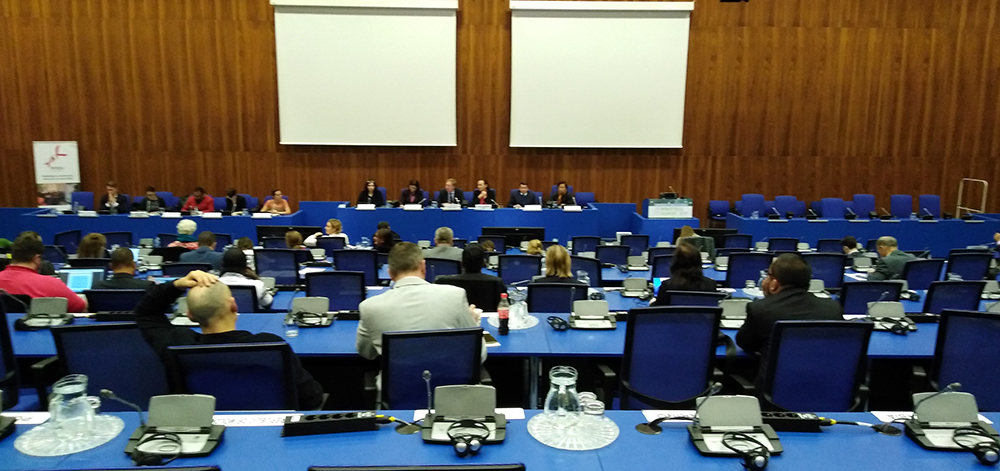While plenary session was open for governmental speeches and the Committee of Whole worked on texts of resolutions, the second day of the CND 2020 was for civil society organisations mainly dedicated to side events.
Side events
Young people use drugs – Bridging the gap between Human Rights and Key Affected Populations
Organized by Students for Sensible Drug Policy
International guidelines on human rights and drug policy, produced by UNODC, have a just a few paragraphs on children who have right to protection from drugs and women who use drugs which human rights should be protected, but don’t have reference on young people who use drugs.
The Barcelona declaration (which “declares that the War On Drugs is a war on Womxn Who Use Drugs”), Par4digma coalition of youth lead organisations from across the world transforming drug policy and Youth and Incarceration/Forced Treatment (rehabilitation) in Nigeria, where this method is employed to patients that are treated as “harmful”, were presented. Presenters also called that the sanctions against drug use should be based on the economic situation of the user.

Improving outreach and multidisciplinary approach towards people who use drugs and people in recovery in Western Balkan countries
Organized by Serbia, and Association Izlazak, Preporod/Rebirth, Proslavi Oporavak/Celebrate Recovery and World Federation Against Drugs
Results of the regional project “Choose Recovery” which is a joint cooperation between World Federation Against Drugs and three civil society organisations in the Balkan region: Izlazak, Celebrate Recovery and Preporod, were presented. The three organisation are working within the recovery field and providing support services to active users, individuals in recovery and members of their families, and they are actively involved in shaping drug policies in their countries.
Also, The Office for Combating Drugs of the Government of the Republic of Serbia presented their work, emphasizing partnership with the civil society as one of the successes of their work.

Comprehensive and evidence-based approach in tackling the world drug problem
Organized by Croatia, and European Union and UNODC Division for Policy Analysis and Public Affairs
The slogan of the Croatian presidency “A strong Europe in a challenging world”
Croatian strongly recommends implementation of all universal conventions dealing with drugs.
After protocolled introductions from the Ambassador of Croatia and Executive Director of UNODC, State secretary in the Ministry of Health Tomislav Dulibić presented Croatian experiences in evidence-based approach to drug problem. He emphasized that Croatia introduced Minimum standards for prevention of addiction in the educational system, implemented a research project “Evaluation of drug treatment in the Republic of Croatia” and performed evaluation of treatment and distribution of substitution therapy.
Alexis Goosdeel underlined that EMCDDA cooperates with Croatia since 2002. They are an excellent experience of serious and comprehensive approach towards accession to EU in the area of drugs. EMCDDA collects data for a purpose, not for statistics.
Victor Sannes, deputy director in the Food, Health Protection and Prevention Directorate presented various projects from The Netherlands.
Gilberto Gerra, UNODC: 60% of countries of the World have health treatment of drug users under ministries of interior or justice!

Homelessness and substance use in city centres: Balanced and evidence-based policies
Organized by Greece, and Correlation – European Harm Reduction Network, Pompidou Group/Council of Europe and Santé Mentale et Exclusion Sociale – Europe
Dr Christos Koumitsidis, National Drug Coordinator, Greece: Homelessness in downtown Athens is an important challenge, exacerbated by factors such mental health conditions, substance use problems, the financial crisis and the influx of refugees fleeing war. These issues do not exist in isolation, they intersect and potentiate vulnerability. Homelessness is a common ground.
Katrin Prins-Schiffer, Correlation – European Harm Reduction Network / De Regenboog Groep: We see the same in the harm reduction and addiction sectors; usually homelessness is left behind. Only Finland has decreased homelessness. They have invested a lot in Housing First. All other countries report increases in homelessness. Part of the problem is that the housing market is under a lot of pressure, mostly because of a lack of affordable housing. We have 150,000 rent-controlled dwellings in Amsterdam; but this is not a lot for a city of 1.2 million; and it’s really hard to access these dwellings. In terms of reasons for homelessness, the majority are about impending evictions or end of renting contract, and leaving home after. There is an ‘integrated care system’ whereby local governments are responsible for housing and homeless care. In terms of the system’s main principles, it’s about focusing on the overall needs; not just drug use, homelessness or mental health. It’s a kind of self-sufficiency matrix including finances, housing, relationships, legal problems, community participation. This system is based on the needs on the individual, not on the organisation and its specific focus.
Victor Soto, SMES Europe: Why are people homeless? Policies (housing policies, health policies) and individual situations (mental conditions, traumatic events, etc.). So we need to address both dimensions. Homelessness is not a fixed category, it should be approach through different lines of action.
Pompidou Group: As the operational context was been changing, stakeholders in this field need to be flexible, in line with operational realities. Common guiding principles need to be developed and revised as practice develops. To develop these principles, we need to learn from each other: what works and what doesn’t, find common ground for cooperation and support.

Homelessness and substance use in city centres: Balanced and evidence-based policies
Organized by Greece, and Correlation – European Harm Reduction Network, Pompidou Group/Council of Europe and Santé Mentale et Exclusion Sociale – Europe
Dr Christos Koumitsidis, National Drug Coordinator, Greece: Homelessness in downtown Athens is an important challenge, exacerbated by factors such mental health conditions, substance use problems, the financial crisis and the influx of refugees fleeing war. These issues do not exist in isolation, they intersect and potentiate vulnerability. Homelessness is a common ground.
Katrin Prins-Schiffer, Correlation – European Harm Reduction Network / De Regenboog Groep: We see the same in the harm reduction and addiction sectors; usually homelessness is left behind. Only Finland has decreased homelessness. They have invested a lot in Housing First. All other countries report increases in homelessness. Part of the problem is that the housing market is under a lot of pressure, mostly because of a lack of affordable housing. We have 150,000 rent-controlled dwellings in Amsterdam; but this is not a lot for a city of 1.2 million; and it’s really hard to access these dwellings. In terms of reasons for homelessness, the majority are about impending evictions or end of renting contract, and leaving home after. There is an ‘integrated care system’ whereby local governments are responsible for housing and homeless care. In terms of the system’s main principles, it’s about focusing on the overall needs; not just drug use, homelessness or mental health. It’s a kind of self-sufficiency matrix including finances, housing, relationships, legal problems, community participation. This system is based on the needs on the individual, not on the organisation and its specific focus.
Victor Soto, SMES Europe: Why are people homeless? Policies (housing policies, health policies) and individual situations (mental conditions, traumatic events, etc.). So we need to address both dimensions. Homelessness is not a fixed category, it should be approach through different lines of action.
Pompidou Group: As the operational context was been changing, stakeholders in this field need to be flexible, in line with operational realities. Common guiding principles need to be developed and revised as practice develops. To develop these principles, we need to learn from each other: what works and what doesn’t, find common ground for cooperation and support.







 This year, the Pompidou Group celebrates its 50th anniversary. It grew from 7 founding states to 41 members today, including 3 non-European countries. Under the motto “Human rights at the heart of drug policies“, the Anniversary will be celebrated throughout the year, in a series of events taking place in Europe and beyond.
This year, the Pompidou Group celebrates its 50th anniversary. It grew from 7 founding states to 41 members today, including 3 non-European countries. Under the motto “Human rights at the heart of drug policies“, the Anniversary will be celebrated throughout the year, in a series of events taking place in Europe and beyond.





















